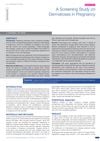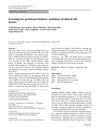 4 citations,
August 2021 in “Theriogenology”
4 citations,
August 2021 in “Theriogenology” Neurosteroids play a key role in controlling the brain-adrenal gland activity in pregnant sheep, both in normal and stressful situations.
[object Object]  2 citations,
March 2020 in “bioRxiv (Cold Spring Harbor Laboratory)”
2 citations,
March 2020 in “bioRxiv (Cold Spring Harbor Laboratory)” HAIR may cause fetal loss by triggering different cell death processes in the uterus and placenta.
 November 2023 in “Berkala Ilmu Kesehatan Kulit dan Kelamin/Berkala ilmu kesehatan kulit dan kelamin (Periodical of dermatology and venerology)”
November 2023 in “Berkala Ilmu Kesehatan Kulit dan Kelamin/Berkala ilmu kesehatan kulit dan kelamin (Periodical of dermatology and venerology)” Addressing skin changes during pregnancy is important to reduce stress for expectant mothers.
12 citations,
December 2020 in “Comprehensive psychoneuroendocrinology” Hormone levels in hair change during pregnancy, with progesterone increasing significantly compared to non-pregnant women.
 November 2021 in “Dermatology Research and Practice”
November 2021 in “Dermatology Research and Practice” The study aims to understand the skin and hair characteristics of mothers and their babies, and how these may affect newborns' skin health and mothers' postpartum hair loss.
 August 2022 in “International Journal of Health Sciences (IJHS)”
August 2022 in “International Journal of Health Sciences (IJHS)” Low levels of zinc, ferritin, and vitamin B12 are linked to severe hair loss in pregnant women during their last two trimesters.
 51 citations,
February 2006 in “Clinics in Dermatology”
51 citations,
February 2006 in “Clinics in Dermatology” Pregnant women often experience skin and hair changes, with over half getting stretch marks and pigment changes, and should be cautious with cosmetic procedures due to potential risks.
 34 citations,
August 2003 in “Clinical and Experimental Dermatology”
34 citations,
August 2003 in “Clinical and Experimental Dermatology” Pregnant women's hair gets thicker.
2 citations,
May 2018 in “PubMed” Pregnant women with isolated hypothyroxinemia face more health issues, so iodine and folic acid supplements are important before and during early pregnancy.
 1 citations,
August 2021 in “Primary Care Diabetes”
1 citations,
August 2021 in “Primary Care Diabetes” Pregnant women with COVID-19 and gestational diabetes may face severe complications, and more research is needed on their outcomes.
February 2024 in “Biomedicines” Pregnant women with PCOS have higher levels of Neurokinin B in the placenta, especially with female babies.
September 2018 in “Obsgyne Review Journal of Obstetric and Gynecology of Siddharth Health Research and Social Welfare Society” Pregnant women often experience a variety of skin problems, including pigmentation changes and stretch marks.
 April 2017 in “International journal of current advanced research”
April 2017 in “International journal of current advanced research” Pregnant women often have skin changes, but only a small percentage have skin conditions caused by or specific to pregnancy; doctors need to tell them apart for proper treatment.
 January 2016 in “Dermatology Online Journal”
January 2016 in “Dermatology Online Journal” Pregnant women with blisters should be checked for bullous impetigo.
45 citations,
January 2016 in “Journal of Epidemiology and Global Health” Most pregnant women experience skin changes, with hyperpigmentation being the most common.
 41 citations,
October 2017 in “International Journal of Women's Dermatology”
41 citations,
October 2017 in “International Journal of Women's Dermatology” Most pregnant women experience skin darkening and hair changes, with these effects usually going away after giving birth.
 36 citations,
April 1990 in “Dermatologic Clinics”
36 citations,
April 1990 in “Dermatologic Clinics” Most pregnant women experience skin changes like darkening and stretch marks, and some may have skin conditions that usually get better after giving birth.
28 citations,
January 1986 in “International Journal of Dermatology” A pregnant woman developed a rash caused by a yeast infection, not acne.
 24 citations,
June 2011 in “International Journal of Dermatology”
24 citations,
June 2011 in “International Journal of Dermatology” Most pregnant women experience skin changes like darkening and itching, while serious skin conditions are rare but need early treatment.
 9 citations,
January 2017 in “Journal of Clinical and Diagnostic Research”
9 citations,
January 2017 in “Journal of Clinical and Diagnostic Research” Most pregnant women experience skin changes, mainly increased pigmentation, and some develop pregnancy-related skin conditions and infections.
 3 citations,
January 2018 in “Indian Dermatology Online Journal”
3 citations,
January 2018 in “Indian Dermatology Online Journal” Most pregnant women in Northeast India experience normal skin changes, with specific pregnancy-related skin conditions being rare.
1 citations,
December 2013 in “BMJ case reports” A pregnant woman with Werner's syndrome died during childbirth, but her baby survived and did not have the syndrome.
 December 2023 in “International journal of research in dermatology”
December 2023 in “International journal of research in dermatology” Most pregnant women experience common skin changes like linea nigra and stretch marks.
 January 2023 in “Our Dermatology Online”
January 2023 in “Our Dermatology Online” Most pregnant women experience skin changes, especially increased pigmentation.
 May 2002 in “British Journal of Dermatology”
May 2002 in “British Journal of Dermatology” A pregnant woman's skin condition improved after giving birth, possibly due to high estrogen levels during pregnancy.
 9 citations,
July 2020 in “Journal of Animal Physiology and Animal Nutrition”
9 citations,
July 2020 in “Journal of Animal Physiology and Animal Nutrition” Melatonin given to pregnant rabbits improved their babies' fur quality.
 5 citations,
January 2014 in “International journal of gynaecology and obstetrics”
5 citations,
January 2014 in “International journal of gynaecology and obstetrics” HIV-positive pregnant women are more likely to experience severe bleeding, and a pregnant woman with familial hypertriglyceridemia had a successful early delivery with special care.
[object Object] 1 citations,
August 2021 in “NeoReviews” Proper diagnosis is crucial to avoid overtreatment and complications in pregnant women with hyperthyroidism.
 49 citations,
March 2009 in “Archives of Gynecology and Obstetrics”
49 citations,
March 2009 in “Archives of Gynecology and Obstetrics” Older age, higher BMI, and family history of diabetes increase the risk of gestational diabetes in pregnant women.
 34 citations,
April 1973 in “The American journal of clinical nutrition”
34 citations,
April 1973 in “The American journal of clinical nutrition” Not enough vitamin B6 in pregnant rats' diets caused poor development and health in their babies.





















